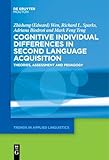Cognitive Individual Differences in Second Language Acquisition : Theories, Assessment and Pedagogy / Zhisheng (Edward) Wen, Adriana Biedroń, Richard L. Sparks, Mark Feng Teng.
Material type: TextSeries: Trends in Applied Linguistics [TAL] ; 19Publisher: Berlin ; Boston : De Gruyter Mouton, [2023]Copyright date: ©2023Description: 1 online resource (XII, 338 p.)Content type:
TextSeries: Trends in Applied Linguistics [TAL] ; 19Publisher: Berlin ; Boston : De Gruyter Mouton, [2023]Copyright date: ©2023Description: 1 online resource (XII, 338 p.)Content type: - 9781614516767
- 9781501500459
- 9781614514749
- 401.93
- P118.2 .W46 2023 ebook
- online - DeGruyter
- Issued also in print.
| Item type | Current library | Call number | URL | Status | Notes | Barcode | |
|---|---|---|---|---|---|---|---|
 eBook
eBook
|
Biblioteca "Angelicum" Pont. Univ. S.Tommaso d'Aquino Nuvola online | online - DeGruyter (Browse shelf(Opens below)) | Online access | Not for loan (Accesso limitato) | Accesso per gli utenti autorizzati / Access for authorized users | (dgr)9781614514749 |
Frontmatter -- Acknowledgments -- Contents -- Foreword -- 1 SLA and Individual Differences: An Overview -- Part I: Age, Intelligence, Aptitude and Affect -- 2 The Age Factor and the Critical Period Hypothesis -- 3 Intelligence -- 4 Foreign Language Aptitude -- 5 Language Aptitude, Psychological and Affective Factors -- Part II: Memory, Attention and Noticing -- 6 Phonological and Executive Working Memory -- 7 Consciousness, Attention and Noticing -- Part III: Learning Strategies, Metacognition and Self- Regulation -- 8 Language Learning Strategies -- 9 Metacognition -- 10 Self-Regulation -- Part IV: L2 Skills, Learning Difficulties, and Anxiety -- 11 L2 Reading and Writing Skills -- 12 L2 Learning Difficulties and Disabilities -- 13 L2 Anxiety: An Affective Factor or a Linguistic Variable? -- Epilogue -- 14 Individual Differences in SLA–Looking Back and Looking Forward -- Author Profiles -- Index
restricted access online access with authorization star
http://purl.org/coar/access_right/c_16ec
This book presents comprehensive, thorough and updated analyses of key cognitive individual difference factors (e.g., age, intelligence, language aptitude, working memory, metacognition, learning strategies, and anxiety) as they relate to the acquisition, processing, assessment, and pedagogy of second or foreign languages. Critical reviews and in-depth research syntheses of these pivotal cognitive learner factors are put into historical and broader contexts, drawing upon the multiple authors' extensive research experience, penetrating insights and unique perspectives spanning applied linguistics, teacher training, educational psychology, and cognitive science. The carefully crafted chapters provide essential course readings and valuable references for seasoned researchers and aspiring postgraduate students in the broad fields of instructed second language acquisition, foreign language training, teacher education, language pedagogy, educational psychology, and cognitive development.
Issued also in print.
Mode of access: Internet via World Wide Web.
In English.
Description based on online resource; title from PDF title page (publisher's Web site, viewed 25. Jun 2024)


